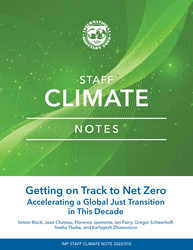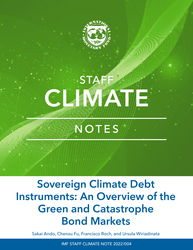
Harnessing Renewables in Sub-Saharan Africa: Barriers, Reforms, and Economic Prospects
To achieve universal electricity access and rapid economic development, SSA must accelerate its electricity generation. Despite rising incomes, electricity production per capita has declined. Leveraging renewable energy, supported by CFPRs, can boost both power generation and GDP
READ MORE...
Volume/Issue:
Volume 2024
Issue 005
Publication date: October 2024
ISBN: 9798400290107
$5.00
Add to Cart by clicking price of the language and format you'd like to purchase
Available Languages and Formats
| English |
Prices in red indicate formats that are not yet available but are forthcoming.
Topics covered in this book
This title contains information about the following subjects.
Click on a subject if you would like to see other titles with the same subjects.
Environmental Economics , Public Policy- Environmental Policy , Sub-Saharan Africa , electricity generation , renewable energy , climate finance , economic development , market reforms , climate policies , IMF staff Climate note , harnessing renewable , part of the International Monetary Fund , IMF analysis , IMF staff Climate , Electricity , Climate policy , Africa , Global , East Africa
Also of interest
Summary
Sub-Saharan Africa needs to significantly accelerate its electricity generation. While hydropower is prominent in some countries, solar and wind power generation has lagged other world regions, even though sub-Saharan Africa has some of the most favorable conditions. A mix of domestic and external financing can increase both renewable electricity generation and GDP. In a scenario where about $25 bn in climate finance flows are allocated annually to renewable energy, renewable electricity production could be up to 24 percent higher than in a scenario excluding this financing, and annual GDP growth would be boosted by 0.8 percentage point on average over the next decade, accompanied by stronger labor demand in the electricity sector. Policies can help catalyze climate finance. An ambitious package of governance, business regulations, and external sector reforms is associated with a 20 percent increase in climate finance flows and a 7 percent increase in electricity generation over five years. In addition, implementing climate policies is linked to increases in green foreign direct investment announcements and green electricity production.
Copyright © 2010 - 2026
Powered by:
AIDC



